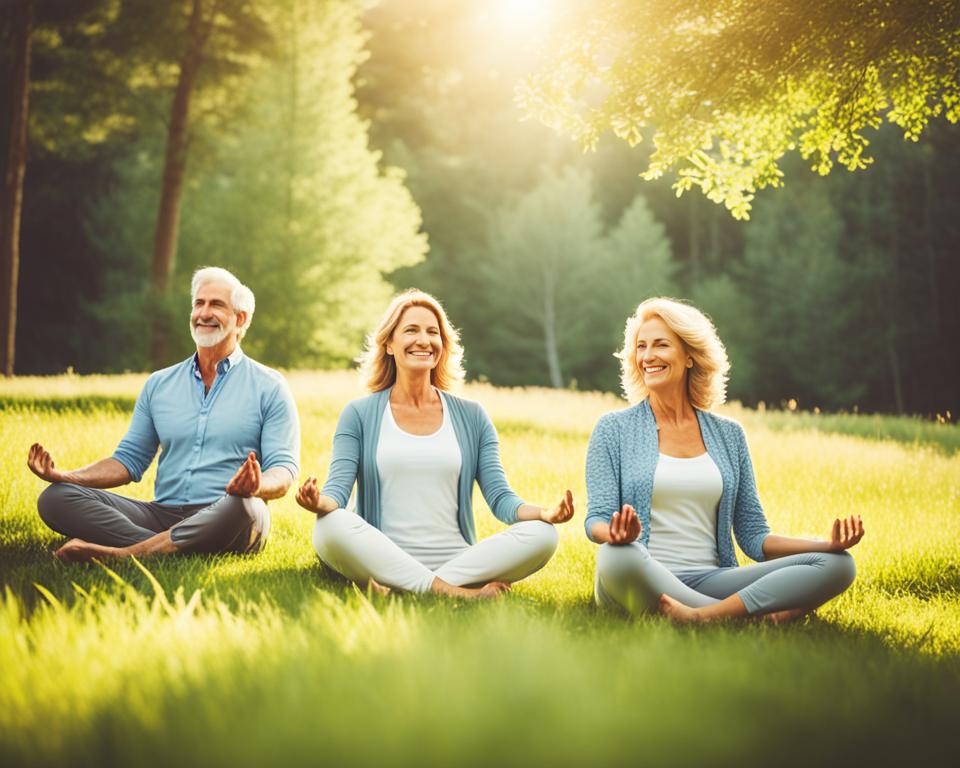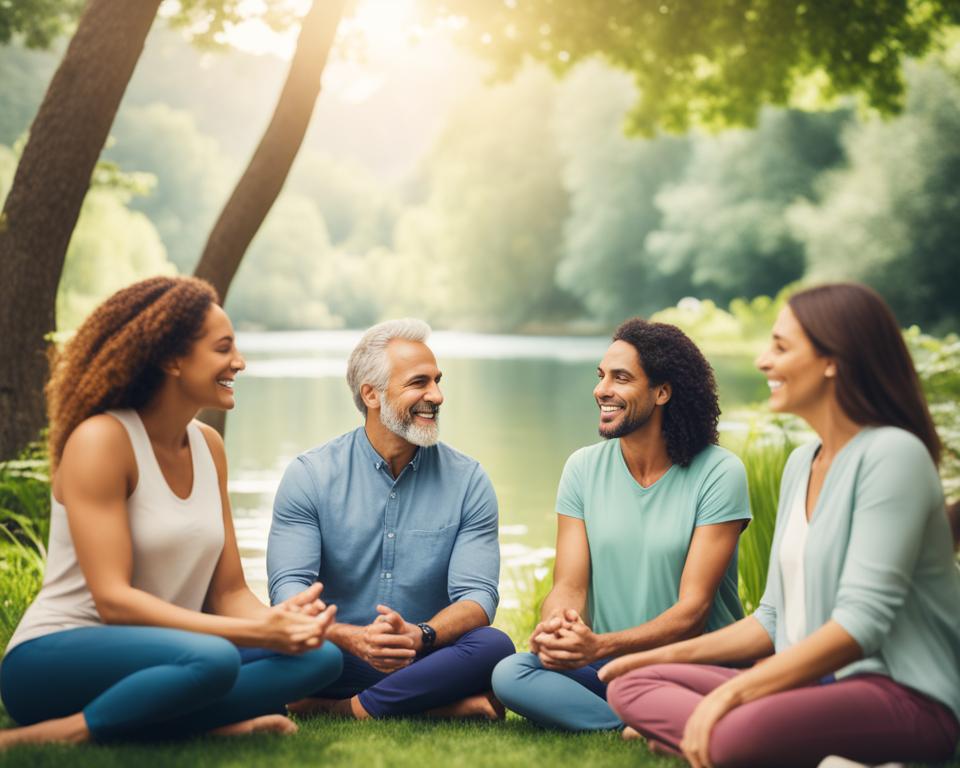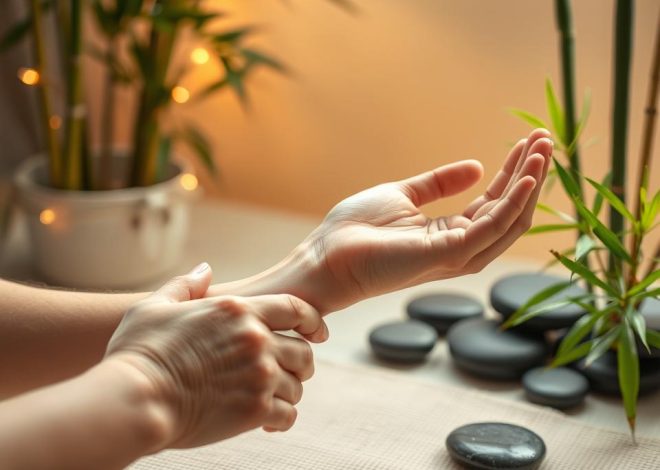
Relaxation Groups for Mental Health: Effective Support
In today’s fast-paced world, the need for effective mental health support has never been more pressing. Relaxation groups for mental health offer a unique and transformative approach to managing stress, anxiety, and improving overall well-being. These specialized groups provide a supportive environment where individuals can learn and practice a range of techniques, including mindfulness meditation, breathing exercises, yoga, and cognitive-behavioral therapy.
By joining a relaxation group, individuals can gain access to the resources and support they need to develop effective coping strategies and achieve a greater sense of balance and calm in their lives. Through the integration of these evidence-based stress reduction techniques and anxiety management strategies, relaxation groups empower participants to take an active role in their mental health recovery and personal growth.
Whether you’re struggling with persistent stress, anxiety, or simply seeking to enhance your overall mental well-being, relaxation groups for mental health can provide the support and resources you need to navigate your journey with greater ease and resilience.
Read more interesting information at ::i-pasta
Understanding Relaxation Groups for Mental Health
Relaxation groups are specialized support groups that focus on teaching and practicing various relaxation techniques to promote mental health and well-being. These groups typically meet regularly, often weekly or bi-weekly, and provide a safe and nurturing environment for participants to learn and engage in activities such as mindfulness meditation, deep breathing exercises, and gentle yoga.
What are Relaxation Groups?
Relaxation groups are support groups that emphasize the practice of stress reduction techniques and anxiety management strategies. These groups offer a structured setting where individuals can learn and implement various relaxation methods, with the goal of improving their overall mental health and well-being.
Benefits of Joining a Relaxation Group
The primary benefits of joining a relaxation group include reduced stress and anxiety, improved emotional regulation, enhanced self-awareness, and the opportunity to connect with others who are on a similar journey of mental health recovery and growth. By participating in these groups, individuals can develop a toolbox of effective coping mechanisms and find a supportive community to share their experiences and challenges.
Mindfulness Meditation for Stress Reduction
Mindfulness meditation is a powerful tool for reducing stress and promoting mental well-being. Relaxation groups often incorporate mindfulness practices, such as focused attention on the breath, body scans, and present-moment awareness. By teaching participants mindfulness techniques for beginners, these groups help individuals develop the skills to cultivate a non-judgmental, curious, and accepting attitude towards their thoughts and emotions.
Incorporating Mindfulness into Daily Life
Integrating mindfulness into daily life, through simple practices like mindful breathing or mindful walking, can further enhance the stress-reducing benefits of these techniques. By incorporating these mindfulness meditation practices into their routines, individuals can experience a greater sense of anxiety management and overall mental well-being.
Stress Reduction Techniques for Mental Well-being
Relaxation groups for mental health often focus on teaching a variety of stress reduction techniques to help participants manage their mental well-being. These techniques may include deep breathing exercises, progressive muscle relaxation, guided imagery, and even laughter therapy. By providing a supportive environment to practice these techniques, relaxation groups empower individuals to develop effective coping strategies that can be applied in their daily lives to alleviate stress and anxiety, as well as other mental health challenges.
Deep breathing exercises, for instance, can help activate the parasympathetic nervous system, inducing a state of relaxation and reducing physiological symptoms of stress and anxiety. Similarly, progressive muscle relaxation, which involves systematically tensing and releasing different muscle groups, can promote a sense of physical and mental calm. Guided imagery, where participants are led through visualization exercises, can also be a powerful tool for stress management by shifting the focus of the mind away from worries and towards more peaceful, soothing thoughts.
Interestingly, even laughter therapy has been found to be an effective stress reduction technique when practiced in a group setting. The act of laughing together can release endorphins, boost mood, and foster a sense of social connection, all of which can contribute to improved mental well-being.
By providing a supportive environment for participants to engage in these diverse stress reduction techniques, relaxation groups empower individuals to develop a repertoire of coping skills that they can draw upon in their daily lives. This not only helps alleviate immediate stress and anxiety, but also promotes long-term mental health and resilience.
Anxiety Management Strategies in Group Settings
Relaxation groups can be particularly beneficial for individuals struggling with anxiety disorders. These groups often incorporate cognitive-behavioral therapy (CBT) techniques, which help participants identify and challenge negative thought patterns that contribute to anxiety. By addressing the cognitive aspects of anxiety, group members can develop a deeper understanding of their mental processes and learn to reframe unhelpful thoughts, ultimately reducing the emotional and physiological symptoms of their anxiety.
Cognitive-Behavioral Therapy in Relaxation Groups
In the supportive environment of a relaxation group, participants engage in CBT exercises that encourage them to explore the relationship between their thoughts, feelings, and behaviors. Through guided discussions, role-playing, and homework assignments, individuals learn to recognize and challenge irrational or distorted beliefs that fuel their anxiety. This group-based approach allows for peer support, shared experiences, and the development of effective coping skills that can be applied in daily life.
Exposure Therapy for Anxiety Disorders
Some relaxation groups may also incorporate exposure therapy, a well-established treatment for anxiety disorders. This evidence-based approach gradually exposes participants to their fears in a supportive and controlled environment, allowing them to confront and overcome their anxiety. By practicing techniques such as gradual exposure and response prevention, group members can develop resilience and learn to manage their anxiety in a healthy and adaptive manner.
By participating in these group-based anxiety management strategies, individuals can build resilience, develop effective coping skills, and find a sense of community and support. The combination of cognitive-behavioral therapy and exposure therapy within the relaxation group setting empowers participants to take an active role in their mental health recovery and long-term well-being.
Relaxation Groups for Mental Health
Relaxation groups for mental health come in a variety of formats, each catering to the unique needs of participants. These groups offer a supportive environment where individuals can learn and practice diverse relaxation techniques to improve their overall well-being.
Types of Relaxation Groups
Some relaxation groups may focus on a specific technique, such as mindfulness meditation or yoga, while others may take a more holistic approach, incorporating multiple relaxation modalities. This diversity allows individuals to find a group that aligns with their personal preferences and goals for coping skills training and mental health recovery.
Finding the Right Group for Your Needs
When searching for the right relaxation group for your needs, it’s important to consider factors such as the group’s approach, facilitator qualifications, schedule, and location. Connecting with a group that resonates with you can greatly enhance the benefits you experience in your mental health journey, as it provides a supportive support group environment where you can learn and practice effective coping strategies.
Support Groups for Mental Health Recovery
Relaxation groups for mental health often function as support groups, providing a safe and welcoming environment for individuals to connect with others who are on a similar journey of recovery and growth. By sharing their experiences, challenges, and coping strategies, participants can benefit from the mutual understanding and empathy of their peers. This peer support can be invaluable in building a strong support network, which can further enhance an individual’s resilience and ability to manage mental health concerns.
Relaxation groups foster a sense of community and belonging, which can be particularly meaningful for those seeking to improve their overall well-being. The group setting allows participants to engage in open and honest discussions, find solace in shared experiences, and develop a deeper understanding of their own mental health struggles and triumphs.
Coping Skills Training in Group Settings
Relaxation groups for mental health often incorporate coping skills training, equipping participants with a variety of healthy strategies to manage stress, anxiety, and other mental health challenges. These groups may teach techniques such as problem-solving, emotion regulation, and stress management.
Developing Healthy Coping Mechanisms
By practicing these skills in a supportive group environment, individuals can develop a toolbox of effective coping mechanisms that they can apply in their daily lives. The group setting allows for the sharing of experiences, peer-to-peer learning, and the reinforcement of healthy coping behaviors, further enhancing the long-term impact of these interventions.

Breathing Exercises for Stress Relief
Relaxation groups often incorporate breathing exercises as a core component of their programs, as controlled breathing has been shown to have a profound impact on reducing stress and anxiety. By teaching participants these techniques and providing opportunities to practice them during group sessions, relaxation groups empower individuals to integrate breathing exercises into their daily routines, promoting long-term mental health benefits.
Diaphragmatic Breathing Techniques
One of the key breathing techniques taught in relaxation groups is diaphragmatic breathing, also known as belly breathing. This involves taking slow, deep breaths that engage the diaphragm, allowing for a more efficient exchange of oxygen and carbon dioxide. Practicing diaphragmatic breathing can effectively activate the parasympathetic nervous system, inducing a state of relaxation and reducing physiological symptoms of stress and anxiety.
Incorporating Breathing Exercises into Daily Life
Relaxation groups empower participants to incorporate breathing exercises into their daily lives, making them a sustainable part of their mental health management strategy. By providing guidance on how to weave these stress-relieving techniques into daily routines, such as during breaks at work or before bedtime, the groups help individuals develop a consistent personal practice. Integrating breathing exercises into everyday life can lead to long-term improvements in stress levels, emotional regulation, and overall well-being.
Yoga for Mental Health and Well-being
Many relaxation groups for mental health incorporate yoga as a means of promoting physical and mental well-being. Gentle yoga poses, such as child’s pose, seated forward folds, and restorative poses, can help participants release tension, calm the mind, and foster a sense of relaxation. These yoga for mental health practices offer a holistic approach to improving overall stress reduction techniques and enhancing the benefits of attending relaxation groups for mental health.
Gentle Yoga Poses for Relaxation
Relaxation groups often incorporate gentle yoga poses that are designed to induce a state of calm and tranquility. Participants may engage in practices like child’s pose, where they can rest their forehead on the mat and allow their body to melt into the ground, releasing any physical or emotional tension. Seated forward folds, such as paschimottanasana, can help participants explore the connection between the mind and body, promoting a deeper sense of self-awareness and relaxation.
Yoga Nidra for Deep Relaxation
In addition to gentle yoga poses, some relaxation groups may offer practices like yoga nidra, a form of guided meditation that induces a deep state of relaxation. During yoga nidra, participants are led through a systematic process of body awareness, breath control, and visualization, allowing them to achieve a state of profound rest and rejuvenation. This practice can be particularly beneficial for individuals seeking to manage stress reduction techniques and improve their overall mental health and well-being.
Guided Imagery for Stress Management
Guided imagery is another technique often utilized in relaxation groups for mental health. This practice involves the use of visualization and imagination to promote relaxation and reduce stress. Participants may be led through guided imagery exercises that encourage them to imagine peaceful, calming scenes or experiences.
Using Visualization Techniques
By engaging the senses and the mind, guided imagery can help individuals achieve a state of deep relaxation and inner calm. Visualization techniques, such as picturing a tranquil beach or a serene forest, can elicit a physiological response that counteracts the body’s stress response, leading to decreased anxiety and improved emotional regulation.
Incorporating Guided Imagery into Group Sessions
Relaxation groups often incorporate these visualization techniques into their sessions, providing participants with the opportunity to practice and experience the benefits of guided imagery in a supportive group setting. The guided nature of these exercises, coupled with the shared experience of the group, can enhance the effectiveness of the stress management strategies, empowering individuals to integrate guided imagery into their personal well-being routines.
Creating a Supportive Group Environment
The success of relaxation groups for mental health often hinges on the creation of a supportive and nurturing group environment. Group facilitators play a crucial role in fostering a sense of community among participants, encouraging open and non-judgmental communication, and establishing clear guidelines for group participation.
Fostering a Sense of Community
By setting expectations around confidentiality, respect, and active listening, group facilitators can help participants feel safe and comfortable sharing their experiences and engaging in the group activities. This sense of community and shared understanding is essential for support groups and coping skills training to be effective in relaxation groups for mental health.
Guidelines for Group Participation
Clear guidelines for group participation, such as respecting each other’s perspectives, actively listening, and maintaining confidentiality, help create an environment where individuals feel empowered to open up and explore their mental health challenges. This structured yet supportive approach enhances the overall benefits and impact of relaxation groups for mental health, enabling participants to fully engage in the process of improving their well-being.
Integrating Relaxation Techniques into Your Life
One of the key goals of relaxation groups for mental health is to empower participants to integrate the learned techniques and strategies into their daily lives. Group facilitators often encourage the development of a personal relaxation practice, providing guidance on how to incorporate mindfulness, breathing exercises, or yoga into daily routines.
Developing a Personal Practice
Establishing a consistent relaxation practice can be a transformative step in maintaining the benefits gained from participating in a relaxation group. Facilitators may suggest starting with just 5-10 minutes per day, gradually increasing the duration as the practice becomes more natural and integrated into one’s lifestyle. Simple techniques like mindful breathing or a brief body scan can be easily incorporated into morning routines, work breaks, or before bedtime.
Overcoming Challenges and Setbacks
However, maintaining a consistent stress reduction techniques and coping skills training practice can be challenging, and participants may face setbacks or difficulties in their journey. Relaxation groups can offer support and resources to help individuals overcome these obstacles, fostering the long-term adoption of healthy coping mechanisms and promoting sustainable improvements in mental well-being.
By providing guidance, encouragement, and a supportive community, relaxation groups for mental health can help participants seamlessly integrate the learned techniques into their daily lives, leading to lasting improvements in their overall mental health and resilience.
Measuring the Impact of Relaxation Groups
Assessing the impact of relaxation groups for mental health is crucial for understanding their effectiveness and ensuring that participants are receiving the support and benefits they need. Group facilitators may employ various methods to evaluate mental health outcomes, such as pre- and post-program assessments, self-reported measures of stress, anxiety, or mood, and feedback from participants.
Evaluating Mental Health Outcomes
By tracking progress and celebrating successes, both large and small, relaxation groups can help individuals recognize their achievements and maintain motivation throughout their mental health recovery journey. This data-driven approach can also inform the continuous improvement of these programs, ensuring that they remain responsive to the needs of the communities they serve.
Tracking Progress and Celebrating Successes
Participants in support groups for mental health may experience a range of benefits, from reduced stress and anxiety to improved coping skills and a greater sense of well-being. By consistently monitoring and evaluating these outcomes, relaxation groups can demonstrate their value and continue to refine their approaches to better support the individuals they serve.

| Outcome Measure | Pre-Program | Post-Program | Change |
|---|---|---|---|
| Perceived Stress Scale | 23.4 | 18.2 | -5.2 |
| Generalized Anxiety Disorder-7 | 12.6 | 8.9 | -3.7 |
| Self-Reported Well-Being | 6.2 | 8.1 | +1.9 |
The data presented in the table demonstrates the positive impact of relaxation groups on participants’ mental health outcomes. By tracking changes in measures such as perceived stress, anxiety, and well-being, group facilitators can quantify the benefits of their coping skills training and make data-driven decisions to enhance their programs.
Resources for Finding Relaxation Groups
For individuals interested in exploring relaxation groups for their mental health, there are a variety of resources available to help them find the right group. By researching these options and reaching out to learn more, people can take the first step towards improving their well-being through the support and techniques offered by relaxation groups.
Online Resources and Support
Online directories and support communities can provide valuable information on virtual or local in-person relaxation groups. These resources can help connect individuals with like-minded peers who are also seeking to enhance their mental health through relaxation-based practices. Exploring these online tools can be a convenient way to discover the relaxation group options that best suit one’s needs and preferences.
Local Community Organizations
Many community organizations, such as mental health clinics, counseling centers, and wellness centers, may offer their own relaxation group programs or have referrals to reputable local options. Reaching out to these community-based resources can be a helpful way to learn about the relaxation groups available in one’s local area. By engaging with these organizations, individuals can find the support and guidance they need to select a relaxation group that aligns with their mental health goals and coping skills training requirements.
Conclusion
Relaxation groups for mental health offer a valuable and effective way for individuals to manage stress, anxiety, and other mental health concerns. By providing a supportive environment and teaching a range of evidence-based relaxation techniques, these groups empower participants to develop healthy coping mechanisms and improve their overall well-being. From mindfulness meditation to yoga, breathing exercises, and guided imagery, relaxation groups offer a holistic approach to mental health recovery.
By fostering a sense of community, facilitating peer support, and promoting the integration of these techniques into daily life, relaxation groups can have a lasting and transformative impact on the lives of those seeking to enhance their mental health and resilience. Through the practice of stress reduction techniques, anxiety management strategies, and the cultivation of a supportive group setting, individuals can navigate their mental health journey with greater ease and a renewed sense of balance.
As the demand for accessible and effective mental health resources continues to grow, the role of relaxation groups for mental health becomes increasingly crucial. By providing a safe and nurturing space for individuals to explore and apply a variety of well-being strategies, these groups offer a valuable path towards long-term mental health improvements and an enhanced quality of life.


